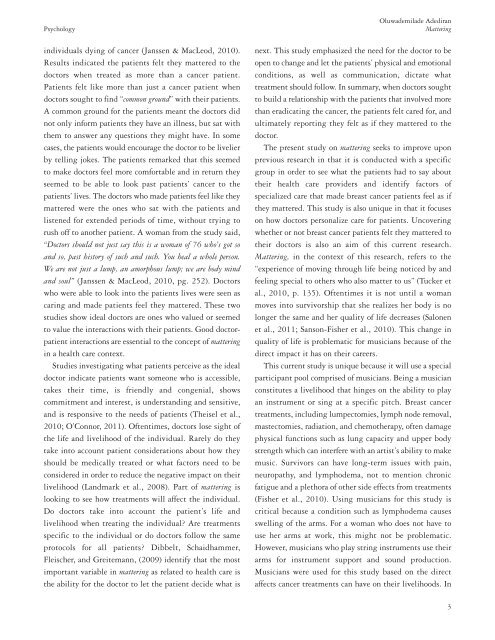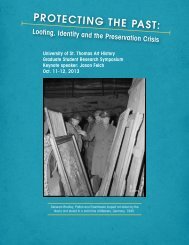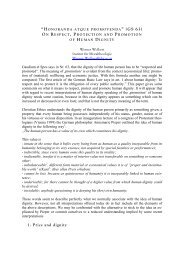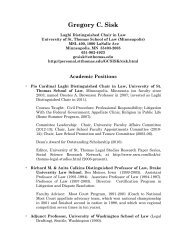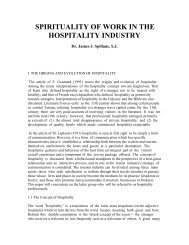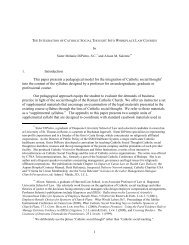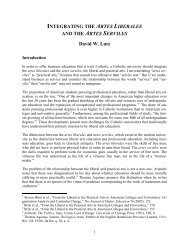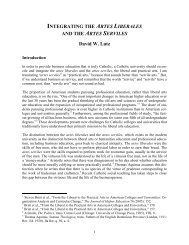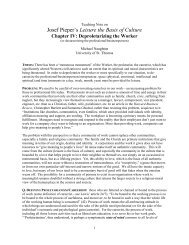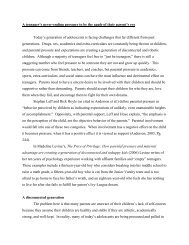dr. ronald e. mcnair acknowledgements - University of St. Thomas
dr. ronald e. mcnair acknowledgements - University of St. Thomas
dr. ronald e. mcnair acknowledgements - University of St. Thomas
Create successful ePaper yourself
Turn your PDF publications into a flip-book with our unique Google optimized e-Paper software.
Oluwademilade Adediran<br />
Psychology Mattering<br />
individuals dying <strong>of</strong> cancer (Janssen & MacLeod, 2010).<br />
Results indicated the patients felt they mattered to the<br />
doctors when treated as more than a cancer patient.<br />
Patients felt like more than just a cancer patient when<br />
doctors sought to find “common ground” with their patients.<br />
A common ground for the patients meant the doctors did<br />
not only inform patients they have an illness, but sat with<br />
them to answer any questions they might have. In some<br />
cases, the patients would encourage the doctor to be livelier<br />
by telling jokes. The patients remarked that this seemed<br />
to make doctors feel more comfortable and in return they<br />
seemed to be able to look past patients’ cancer to the<br />
patients’ lives. The doctors who made patients feel like they<br />
mattered were the ones who sat with the patients and<br />
listened for extended periods <strong>of</strong> time, without trying to<br />
rush <strong>of</strong>f to another patient. A woman from the study said,<br />
“Doctors should not just say this is a woman <strong>of</strong> 76 who’s got so<br />
and so, past history <strong>of</strong> such and such. You heal a whole person.<br />
We are not just a lump, an amorphous lump; we are body mind<br />
and soul” (Janssen & MacLeod, 2010, pg. 252). Doctors<br />
who were able to look into the patients lives were seen as<br />
caring and made patients feel they mattered. These two<br />
studies show ideal doctors are ones who valued or seemed<br />
to value the interactions with their patients. Good doctorpatient<br />
interactions are essential to the concept <strong>of</strong> mattering<br />
in a health care context.<br />
<strong>St</strong>udies investigating what patients perceive as the ideal<br />
doctor indicate patients want someone who is accessible,<br />
takes their time, is friendly and congenial, shows<br />
commitment and interest, is understanding and sensitive,<br />
and is responsive to the needs <strong>of</strong> patients (Theisel et al.,<br />
2010; O’Connor, 2011). Oftentimes, doctors lose sight <strong>of</strong><br />
the life and livelihood <strong>of</strong> the individual. Rarely do they<br />
take into account patient considerations about how they<br />
should be medically treated or what factors need to be<br />
considered in order to reduce the negative impact on their<br />
livelihood (Landmark et al., 2008). Part <strong>of</strong> mattering is<br />
looking to see how treatments will affect the individual.<br />
Do doctors take into account the patient’s life and<br />
livelihood when treating the individual? Are treatments<br />
specific to the individual or do doctors follow the same<br />
protocols for all patients? Dibbelt, Schaidhammer,<br />
Fleischer, and Greitemann, (2009) identify that the most<br />
important variable in mattering as related to health care is<br />
the ability for the doctor to let the patient decide what is<br />
next. This study emphasized the need for the doctor to be<br />
open to change and let the patients’ physical and emotional<br />
conditions, as well as communication, dictate what<br />
treatment should follow. In summary, when doctors sought<br />
to build a relationship with the patients that involved more<br />
than eradicating the cancer, the patients felt cared for, and<br />
ultimately reporting they felt as if they mattered to the<br />
doctor.<br />
The present study on mattering seeks to improve upon<br />
previous research in that it is conducted with a specific<br />
group in order to see what the patients had to say about<br />
their health care providers and identify factors <strong>of</strong><br />
specialized care that made breast cancer patients feel as if<br />
they mattered. This study is also unique in that it focuses<br />
on how doctors personalize care for patients. Uncovering<br />
whether or not breast cancer patients felt they mattered to<br />
their doctors is also an aim <strong>of</strong> this current research.<br />
Mattering, in the context <strong>of</strong> this research, refers to the<br />
“experience <strong>of</strong> moving through life being noticed by and<br />
feeling special to others who also matter to us” (Tucker et<br />
al., 2010, p. 135). Oftentimes it is not until a woman<br />
moves into survivorship that she realizes her body is no<br />
longer the same and her quality <strong>of</strong> life decreases (Salonen<br />
et al., 2011; Sanson-Fisher et al., 2010). This change in<br />
quality <strong>of</strong> life is problematic for musicians because <strong>of</strong> the<br />
direct impact it has on their careers.<br />
This current study is unique because it will use a special<br />
participant pool comprised <strong>of</strong> musicians. Being a musician<br />
constitutes a livelihood that hinges on the ability to play<br />
an instrument or sing at a specific pitch. Breast cancer<br />
treatments, including lumpectomies, lymph node removal,<br />
mastectomies, radiation, and chemotherapy, <strong>of</strong>ten damage<br />
physical functions such as lung capacity and upper body<br />
strength which can interfere with an artist’s ability to make<br />
music. Survivors can have long-term issues with pain,<br />
neuropathy, and lymphodema, not to mention chronic<br />
fatigue and a plethora <strong>of</strong> other side effects from treatments<br />
(Fisher et al., 2010). Using musicians for this study is<br />
critical because a condition such as lymphodema causes<br />
swelling <strong>of</strong> the arms. For a woman who does not have to<br />
use her arms at work, this might not be problematic.<br />
However, musicians who play string instruments use their<br />
arms for instrument support and sound production.<br />
Musicians were used for this study based on the direct<br />
affects cancer treatments can have on their livelihoods. In<br />
3


